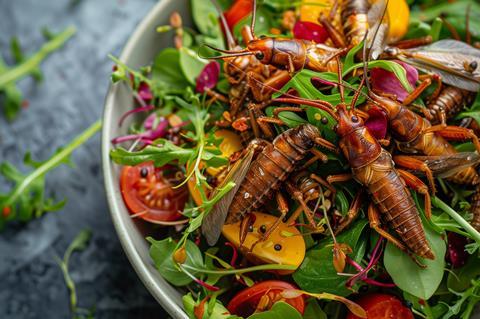Convenience retailer asks experts for their views on what we will be eating in 2054

British farmers will be cherished, avocados and olives will be grown in Surrey, and insect salads will be a staple of the British mealtime.
Those are among the predictions forming part of the Co-op’s vision for the UK in 30 years’ time. The convenience chain’s Responsible Retailing Report explores the nation’s changing views on food ethics and sustainability over the past 30 years, and to mark its release it has asked experts to cast their minds forward to what the food landscape could look like three decades into the future.
As part of that, experts from FixOurFood and the University of York predict that by 2054, the food Brits eat could look drastically different, with options that seem radical, and almost unbelievable in 2024, becoming the norm.
Valued farmers
The next 30 years will see farmers and producers become more valued in society, the experts predict, while a rise in urban indoor farming across Britain will see more lab-grown meat and seafood, cultivated from animal tissues to produce steaks, burgers, tuna and even lobster, becoming mainstream.
Consumers will become more health conscious, with diets more flexitarian-based, leading to alternative insect proteins including locusts, grasshoppers and crickets becoming part of our daily diets, either as snacks or as the protein element of a main meal.
The impact of climate change will see the likes of avocados and olives being grown in Surrey by 2054, the report claims, with less reliance on imported vegetables and an increased preference for locally sourced produce. Extensive plant breeding will mean new varieties, not known widely currently, such as the fast-growing freshwater fern azolla used for soups, salads and even burgers.
Meanwhile, supporting Fairtrade will become even more critical, with smallholder farming communities across the globe disproportionally more impacted by climate change.
Pickling veg
The experts predict that traditional preserving methods will come to the fore, as pickling of vegetables is expected to be embraced widely to help Brits reduce food waste and enjoy vegetables beyond traditional seasons. That could see additions such as Yorkshire rhubarb pickles used in dishes like stir fries and a lentil dahl.
While food diversity will improve, so will cooking skills, with Brits having more leisure time to create delicious dishes following the introduction of the four-day work week brought in by 2054.
Bob Doherty, director of FixOurFood and dean of the School for Business and Society at the University of York, said: “The last 30 years we have seen scientific leaps into more sustainable produce which were unimaginable to most back in 1994.
“From lab-grown meat to vertical farming, the future of food is set to revolutionise how we eat. By 2054, British people will have edible insects on their dinner plate, and we may see the crushing up of crickets quicker than wholegrains. As climate change continues to impact our planet, we’ll also see a shift towards locally grown produce, with avocados grown in Surrey becoming a reality.
“We may even see the introduction of 3D-printed food. As we navigate the challenges of climate change, we’ll need to embrace these innovations to ensure that we can feed a growing population sustainably.”



